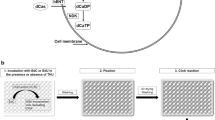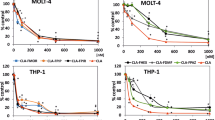Abstract
The clinical importance of the dCTP salvage pathway is given by the fact that deoxycytidine (dCyd) analogs like cytosine arabinoside (ara-C) are activated via the salvage pathway. The non-toxic prodrug ara-C gains its cytotoxic potential by phosphorylation to the 5′-triphosphate ara-CTP. Not only cellular accumulation, but also retention of ara-CTP are known determinants of response to antileukemic treatment. Deoxycytdine kinase is the rate-limiting enzyme for intracellular ara-CTP formation. Experiments performed with purified dCK (dCK) demonstrated that dCTP, the final product of phosphorylation, acts as a potent feed-back inhibitor of dCyd kinase.1,2 In fact, depletion of intracellular dCTP as induced by inhibition of the de novo pathway increases of ara-C phosphorylation.3 Therefore it was concluded that the release of dCTP-mediated feed-back inhibition was responsible for enhanced dCK activity. The present study investigates the role of dCTP for regulation of dCK activity in the cell lines CCRF-CEM (T-cell line), Raji (B-cell line), HL-60 (promyelocytic), and CHO (Chinese hamster ovary). Compared to T-cells, B-cells are characterised by a fast turnover of dNTP and a short retention of ara-CTP. CHO cells were included because of their deficiency in deoxycytidylate (dCMP) deaminase activity. Cellular accumulation of ara-CTP was evaluated as a measure of salvage pathway activity. Inhibition of ribonucleotide reductase as induced by hydroxyurea may cause an activation of the salvage pathway to maintain adequate dCTP levels for DNA synthesis. Cells with a fast dCTP turnover and a greater dependence on the de novo pathway should respond with a greater enhancement of the salvage pathway than cells with long retention of deoxynucleotides and a correspondingly lower dependence on the de novo pathway.4
Access this chapter
Tax calculation will be finalised at checkout
Purchases are for personal use only
Preview
Unable to display preview. Download preview PDF.
Similar content being viewed by others
References
Momparler R L, Fischer G A. Mammalian deoxynucleoside kinases. J Biol Chem 243: 4298–4304, 1968
Kim M-Y, Ives D H. Human deoxycytdine kinase:kinetic mechanism and end product regulation Biochemistry 28: 9043–9047, 1989
Plagemann P G W, Marz R, Wohlhueter R M. Transport and metabolism of deoxycytidine and 1-β-D-arabinofuranosylcytosine into cultured Novikoff rat hepatoma cells, relationship to phosphorylation, and regulation of triphosphate synthesis. Cancer Res 38: 978–989, 1978
Kubota M, Takimoto T, Tanizawa A, Akiyama Y, Mikawa H. Differential modulation of 1-β-D-arabinofuranosylcytosine metabolism by hydroxyurea in human leukemic cells. Biochem Pharmacol 37: 1745–1749, 1988
Heinemann V, Plunkett W. Modulation of deoxynucleotide metabolism by the deoxycytidylate deaminase inhibitor 3,4,5,6-tetrahydrodeoxyuridine. Biochemical Pharmacol 38: 4115–4121, 1989
Abe I, Saito S, Hori K, Suzuki M, Sato H. Role of dephosphorylation of 1-β-D-arabinofuranosylcytosine 5′-triphosphate in human lymphoblastic cell lines with reference to their drug sensitivity. Cancer Res 42: 2846–2851, 1982
Shewach D, Reynolds K K, Hertel L. Nucleotide specificity of human deoxycytidine kinase. Mol Pharmacol 42: 518–524, 1992
Author information
Authors and Affiliations
Editor information
Editors and Affiliations
Rights and permissions
Copyright information
© 1998 Springer Science+Business Media New York
About this chapter
Cite this chapter
Heinemann, V., Schulz, L., Issels, R.D., Wilmanns, W. (1998). Regulation of Deoxycytidine Kinase by Deoxycytidine and Deoxycytidine 5′ Triphosphate in Whole Leukemia and Tumor Cells. In: Griesmacher, A., Müller, M.M., Chiba, P. (eds) Purine and Pyrimidine Metabolism in Man IX. Advances in Experimental Medicine and Biology, vol 431. Springer, Boston, MA. https://doi.org/10.1007/978-1-4615-5381-6_49
Download citation
DOI: https://doi.org/10.1007/978-1-4615-5381-6_49
Publisher Name: Springer, Boston, MA
Print ISBN: 978-1-4613-7456-5
Online ISBN: 978-1-4615-5381-6
eBook Packages: Springer Book Archive




